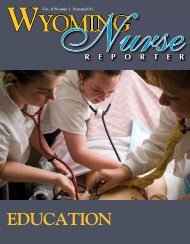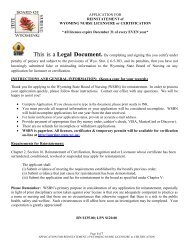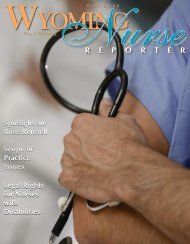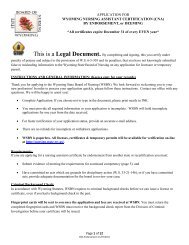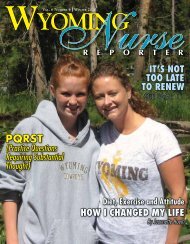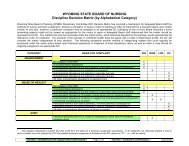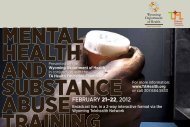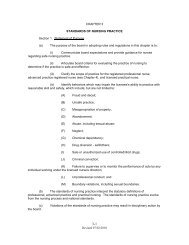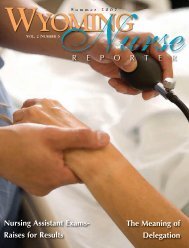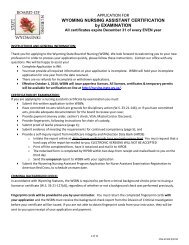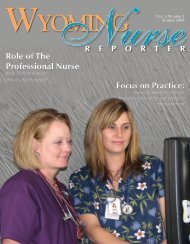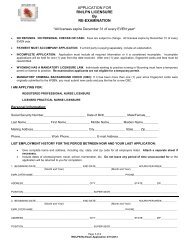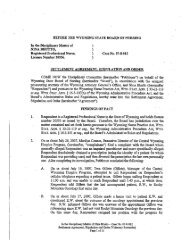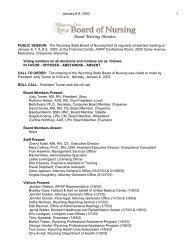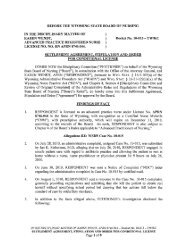CHAPTER 1 - Wyoming State Board of Nursing
CHAPTER 1 - Wyoming State Board of Nursing
CHAPTER 1 - Wyoming State Board of Nursing
Create successful ePaper yourself
Turn your PDF publications into a flip-book with our unique Google optimized e-Paper software.
<strong>CHAPTER</strong> 1<br />
GENERAL PROVISIONS<br />
Section 1. Authority.<br />
(a) These rules and regulations are promulgated by the <strong>Wyoming</strong> <strong>State</strong> <strong>Board</strong> <strong>of</strong><br />
<strong>Nursing</strong> pursuant to it’s their authority under the <strong>Wyoming</strong> Nurse <strong>Nursing</strong> Practice Act, W.S. 33-<br />
21-119 through 33-21-1567; and pursuant to the <strong>Wyoming</strong> Administrative Procedure Act, W.S.<br />
16-3-101, et seq.; and pursuant to applicable federal requirements.<br />
(b) The board shall have all <strong>of</strong> the duties, powers and authority granted by and<br />
necessary to the enforcement <strong>of</strong> the <strong>Wyoming</strong> Nurse <strong>Nursing</strong> Practice Act and reasonable rules<br />
governing the regulation <strong>of</strong> advanced practice registered nurses practitioners <strong>of</strong> nursing,<br />
registered pr<strong>of</strong>essional nurses, licensed practical nurses, and nursing assistants/nurse aides.<br />
(c)<br />
Without limiting the foregoing, the board may do the following:<br />
(i) Have the authority to Make, adopt, amend, repeal and enforce uniform<br />
and reasonable standards, considering national standards and current best evidence, for nursing<br />
practice and nursing assistant/nurse aide functions;<br />
(ii)<br />
required standards;<br />
Issue licenses and certificates to qualified individuals who have met the<br />
(iii) Conduct investigations, hearings and proceedings concerning alleged<br />
violations <strong>of</strong> the board's rules and regulations and the <strong>Wyoming</strong> Nurse <strong>Nursing</strong> Practice Act;<br />
(A) Request criminal history background information on license or<br />
certificate applicants as authorized by under W.S. 7-19-106(a)(viii);<br />
(B) Require fingerprints and other information necessary for a<br />
criminal history record background check pursuant to W.S. 7-19-201; 33-21-122(c)(xxiv; 33-21-<br />
127(d).<br />
(iv) Compel attendance <strong>of</strong> witnesses, issue subpoenas and administer oaths<br />
to those testifying at hearings;<br />
aides;<br />
(v)<br />
Implement a disciplinary process for nurses and nursing assistants/nurse<br />
(vi) Determine and administer appropriate disciplinary action against all<br />
individuals found to have violated guilty <strong>of</strong> violating the board rules and regulations or and the<br />
<strong>Wyoming</strong> Nurse <strong>Nursing</strong> Practice Act;<br />
(vii) Publish advisory opinions regarding acceptable standards <strong>of</strong> nursing and<br />
nursing practice and nursing assistant/nurse aide functions;<br />
(viii) Provide consultation, Conduct conferences, forums, studies and<br />
research on nursing practice and education;<br />
(ix)<br />
Determine and collect reasonable fees not to exceed statutory limits;<br />
1-1
the board.<br />
(x)<br />
Receive and expend funds for the pursuit <strong>of</strong> the authorized objectives <strong>of</strong><br />
(xi) Develop and enforce uniform standards for nursing education programs,<br />
certified nursing assistant II training, competency and evaluation programs and medication<br />
assistant training, competency and evaluation programs;<br />
(xii)<br />
<strong>of</strong> the board; and<br />
Approve nursing education programs that meet the prescribed standards<br />
(xiii) Approve nursing assistant II and medication assistant training,<br />
competency and evaluation programs that meet the prescribed standards <strong>of</strong> the board.<br />
(d) These rules do not require The <strong>Board</strong> <strong>of</strong> <strong>Nursing</strong> is not required to act upon<br />
violations <strong>of</strong> these rules their provisions whenever, in the board's opinion, the public interest will<br />
be served adequately by providing a suitable written notice or <strong>of</strong> warning to affected parties.<br />
(e) The responsibility for enforcement <strong>of</strong> the provisions <strong>of</strong> these rules is vested in the<br />
<strong>Board</strong> <strong>of</strong> <strong>Nursing</strong>.<br />
Section 2. <strong>State</strong>ment <strong>of</strong> Purpose.<br />
(a) These rules and regulations are adopted to implement the authority <strong>of</strong> the<br />
<strong>Wyoming</strong> <strong>State</strong> <strong>Board</strong> <strong>of</strong> <strong>Nursing</strong> to:<br />
(i) Regulate the qualifications and standards <strong>of</strong> performance <strong>of</strong> nurses and<br />
nursing assistants/nurse aides practicing in <strong>Wyoming</strong>;<br />
(ii) Develop and enforce standards for nursing and nursing assistant/nurse<br />
aide education programs;<br />
(iii) Approve nursing and nursing assistant/nurse aide education programs<br />
that meet the standards;<br />
(iv) Provide for enforcement and proper administration <strong>of</strong> the provisions <strong>of</strong><br />
the <strong>Wyoming</strong> Nurse <strong>Nursing</strong> Practice Act and the board's rules and regulations;<br />
(v) Administer appropriate disciplinary action against advanced practice<br />
registered nurses practitioners <strong>of</strong> nursing, registered pr<strong>of</strong>essional nurses, licensed practical<br />
nurses, and certified nursing assistants/nurse aides for proven violations <strong>of</strong> the <strong>Wyoming</strong> Nurse<br />
<strong>Nursing</strong> Practice Act; the board's rules and regulations; and applicable federal requirements;<br />
Section 3. Severability.<br />
(a) If any provision <strong>of</strong> these regulations or the application there<strong>of</strong> to any person or<br />
circumstance is invalid, such invalidity shall not affect other provisions or application <strong>of</strong> these<br />
regulations which can be given effect without the invalid provision or application, and to this end<br />
the provisions <strong>of</strong> these regulations are declared to be severable.<br />
Section 4. Terms Defined by Statute.<br />
(a) Terms defined in W.S. 33-21-119 through 33-21-1567 shall have the same<br />
meaning when used in these regulations unless the context or subject matter clearly requires a<br />
different interpretation.<br />
1-2
Section 5. Terms Defined Herein.<br />
(a) As used in these regulations, the following terms shall have the meanings set<br />
forth unless the context or subject matter clearly requires a different interpretation.<br />
Section 6. Definitions.<br />
(a) The definitions set out in the <strong>Wyoming</strong> Nurse <strong>Nursing</strong> Practice Act, W.S. 33-21-<br />
120, are hereby incorporated by reference to these rules and regulations. In addition, as used in<br />
these rules and regulations, the following definitions shall apply:<br />
(i) "Abandonment" means the termination <strong>of</strong> a client relationship or client<br />
contact without the client's knowledge (when appropriate) and without making arrangements for<br />
appropriate continuation <strong>of</strong> care; and may include:<br />
(A) Insufficient observation; that is, the failure to provide adequate<br />
assessment and intervention directly or indirectly through inadequate supervision <strong>of</strong> other nursing<br />
care providers;<br />
(B) Failure to assure competent intervention; that is, the failure to<br />
intervene when client condition warrants intervention; the delegation or assignment <strong>of</strong> care to an<br />
unqualified care giver; or the acceptance <strong>of</strong> assignments beyond the individual level <strong>of</strong><br />
competency; and<br />
(A)(C) Withdrawal <strong>of</strong> service; that is, after having accepted the<br />
assignment, the failure to give sufficient notice to a manager or other responsible party <strong>of</strong> intent to<br />
cease providing nursing care so that arrangements can be made for continuation <strong>of</strong> care.<br />
(ii) "Abuse" means any behavior that is designed to control and subjugate<br />
another human being through the use <strong>of</strong> fear, humiliation, or assault, either verbal or physical<br />
assaults.<br />
(iii) "Academic facilities" means the physical facilities <strong>of</strong> the governing body<br />
such as classrooms, <strong>of</strong>fices, laboratories, libraries, hospitals and other essential resources<br />
available to conduct an educational required for the program.<br />
(iv) "Acceptable documentation <strong>of</strong> employment" means any evidence that<br />
clearly substantiates an individual was employed in the capacity <strong>of</strong> an advanced practice<br />
registered nurse practitioner <strong>of</strong> nursing; a licensed nurse; or a nursing assistant/nurse aide.<br />
(v) "Acceptable documentation <strong>of</strong> program completion" means an <strong>of</strong>ficial or<br />
notarized copy <strong>of</strong> a certificate <strong>of</strong> completion or an <strong>of</strong>ficial transcript from a board-approved<br />
education and/or training program.<br />
(vi) “Accountability” means being responsible and answerable for actions or<br />
inactions <strong>of</strong> self and others in the context <strong>of</strong> delegation.<br />
(vi)(vii) "Accreditation" means an <strong>of</strong>ficial authorization or status granted by a<br />
nationally recognized accrediting agency.<br />
(vii)(viii) "Administrative head" means the registered pr<strong>of</strong>essional nurse faculty<br />
member who has the responsibility to administer the nursing education program regardless <strong>of</strong> the<br />
<strong>of</strong>ficial title assigned by the governing body.<br />
1-3
(ix) “Advisory opinion” means a statement developed by the board to provide<br />
guidance, clarification and direction regarding whether nursing or nursing assistant practice,<br />
procedures, or policies comply with acceptable standards or nursing or nursing assistant practice<br />
as defined in the <strong>Wyoming</strong> Nurse Practice Act and board rules and regulations.<br />
(x) “Alford Plea” means a plea agreement where the defendant has pled<br />
guilty yet not admitted to all the facts that comprise the crime.<br />
(viii)(xi) "Annual report" means a condensed report from a board-approved<br />
nursing education program which summarizes significant revisions pertaining to the criteria <strong>of</strong> as<br />
stated in the established standards for nursing education programs.<br />
(xii) “Applicant” means any person applying for any type <strong>of</strong> license, permit or<br />
certificate issued by the board.<br />
(xiii) “Assignment” means the performance <strong>of</strong> designated nursing<br />
activities/tasks by a licensed nurse or certified nursing assistant that are consistent with the scope<br />
<strong>of</strong> practice <strong>of</strong> the licensed nurse or the role description <strong>of</strong> the certified nursing assistant; the<br />
distribution <strong>of</strong> work that each staff member is to accomplish on a given shift or work period.<br />
(xiv)<br />
(xv)<br />
“Authority” means the source <strong>of</strong> the power to act.<br />
“Biennial” means an event that occurs every two years.<br />
(ix)(xvi) "<strong>Board</strong>" means the <strong>Wyoming</strong> <strong>State</strong> <strong>Board</strong> <strong>of</strong> <strong>Nursing</strong> as defined by W.S.<br />
33-21-119 thru 33-21-1567.<br />
(x)(xvii) "Boundaries" mean the conscious limits <strong>of</strong> the pr<strong>of</strong>essional relationship<br />
that allow for safe therapeutic connection between the pr<strong>of</strong>essional and the client. a practitioner<br />
places on his/her actions and interactions with clients in order to protect the space between<br />
his/her power and their vulnerability. Boundaries protect the space between the pr<strong>of</strong>essional’s<br />
powers and the client’s vulnerability. Establishing boundaries provides a means for a<br />
pr<strong>of</strong>essional’s control <strong>of</strong> this power differential and allows for a safe connection based on the<br />
client’s need. The pr<strong>of</strong>essional is responsible for delineating and maintaining the control this<br />
power differential and allow for a safe connection based upon the client's needs. While the client<br />
may initiate what would be a boundary issue, it is always the responsibility <strong>of</strong> the practitioner to<br />
establish and maintain boundaries.<br />
(xi) "Canadian Nurses' Association Testing Service" means the Canadian<br />
organization which has the authority to develop and administer the Canadian national nursing<br />
licensure examination.<br />
(xii)(xviii)"Candidate" means an individual who has met all the requirements for<br />
completion <strong>of</strong> a board-approved nursing education program, and is applying for a graduate<br />
temporary permit or licensure by examination.<br />
(xix) “Certificate holder” means a person to whom a certificate is granted to<br />
practice as a certified nursing assistant.<br />
(xiii) "Certified <strong>Nursing</strong> Assistant/Nurse Aide" means a person who performs<br />
delegated nursing related tasks and services, regardless <strong>of</strong> title or care setting, who has<br />
completed a specified course <strong>of</strong> study, has met minimum competency requirements, and is<br />
certified by the board.<br />
1-4
(xiv)(xx) "Client" means a recipient <strong>of</strong> care and may be an individual, family,<br />
group, or community patient, resident, or client.<br />
(xv)(xxi) "Clinical facilities" means those institutions which are established for the<br />
delivery <strong>of</strong> healthcare services, and which are utilized by students enrolled in nursing education<br />
programs or nurse aide training, competency and evaluation programs.<br />
(xxii) “Competence” means the application <strong>of</strong> knowledge and the<br />
interpersonal, decision-making and psychomotor skills expected for the practice role, within the<br />
context <strong>of</strong> public health, safety and welfare.<br />
(xvi)(xxiii)"Competency examination" means an objective examination approved<br />
by the board to determine minimal entry level <strong>of</strong> safe nursing practice at entry level competence<br />
<strong>of</strong> the practitioner.<br />
(xvii) “Collaboration” means a process which involves two or more health care<br />
pr<strong>of</strong>essionals working together toward common goals, each contributing his or her respective<br />
area <strong>of</strong> expertise, in order to provide more comprehensive care than either one alone could <strong>of</strong>fer.<br />
(xviii)(xxiv) "Complainant" means the person(s), organization or agency who<br />
initiatesd a the complaint.<br />
(xix)(xxv)"Conditional approval" means a temporary the status given to a nursing<br />
education program which has not met the criteria <strong>of</strong> the for a period <strong>of</strong> time determined by the<br />
board for failure to meet the criteria as stated in the established standards for nursing education<br />
programs, and which specifies deficiencies that shall be removed or corrected within a<br />
designated period <strong>of</strong> time determined by the board.<br />
(xx)(xxvi)"Continued competency" means the method by which a nurse or<br />
certified nursing assistant maintains or refines practice knowledge, skills and abilities, which can<br />
occur through a formal education program, continuing education, or clinical practice, and is<br />
expected to continue throughout the individual’s career nursing practice or educational<br />
experience beyond basic nursing preparation, which promotes the skillful and pr<strong>of</strong>icient<br />
performance <strong>of</strong> functions within the role <strong>of</strong> the licensee and contributes to the essential<br />
knowledge, judgment and skills for the enhancement <strong>of</strong> nursing practice.<br />
(xxi)(xxvii)"Current" means new, present, most recent.<br />
(xxii)(xxviii)"Delegation" means transferring to a competent individual the<br />
authority to perform a specific nursing task in a selected situation. The nurse retains the transfer<br />
<strong>of</strong> responsibility and accountability for the delegated tasks. for the performance <strong>of</strong> an activity from<br />
one individual to another;<br />
and<br />
(A) The delegator retains the accountability for the overall outcome <strong>of</strong> the delegation,<br />
(B) The delegatee retains the burden for appropriately performing the delegated<br />
tasks or activities and keeping the delegator informed;<br />
(C) Delegation is unnecessary if the particular activity or task is already within the<br />
legally recognized scope <strong>of</strong> practice <strong>of</strong> the individual [delegatee] who is to perform the activity or<br />
task;<br />
1-5
(I.) An element <strong>of</strong> assignment exists in all delegation; however, for the purpose<br />
<strong>of</strong> these rules, assignment means that an individual designates another to be responsible for<br />
specific patients or selected nursing functions for specifically identified patients;<br />
(II.) Both "assignment" and "delegation" decisions must be made by the licensed<br />
nurse on the basis <strong>of</strong> the skill levels <strong>of</strong> the care givers, the care needs <strong>of</strong> patients or clients, and<br />
other considerations;<br />
delegated.<br />
(D) If the activity or task is not within the delegator's scope <strong>of</strong> practice, it cannot be<br />
(xxix) “Direct care” means primary care or a basic level <strong>of</strong> healthcare usually<br />
given by a healthcare provider.<br />
(xxiii)(xxx) "Direction" means the intermittent observation, guidance and<br />
evaluation <strong>of</strong> the nursing practice <strong>of</strong> another by a licensed physician, dentist or registered<br />
pr<strong>of</strong>essional nurse who may only occasionally be physically present; or joint development <strong>of</strong> a<br />
plan <strong>of</strong> care in advance by those individuals involved which will be implemented by others without<br />
the physical presence <strong>of</strong> a licensed physician, dentist, or registered pr<strong>of</strong>essional nurse. In the<br />
latter situation, a licensed physician, dentist or registered pr<strong>of</strong>essional nurse shall be available for<br />
consultation in the event circumstances arise that cause consultation to be necessary. The<br />
degree <strong>of</strong> direction needed shall be determined by evaluation <strong>of</strong> the patient care situation, and<br />
the educational preparation and demonstrated pr<strong>of</strong>iciency <strong>of</strong> others.<br />
verbal communication;<br />
(A)<br />
Monitoring and guiding the practice <strong>of</strong> another through written or<br />
(B) The intermittent observation, guidance and evaluation <strong>of</strong> the<br />
nursing practice <strong>of</strong> another by a licensed physician, advanced practice registered nurse, dentist<br />
or registered pr<strong>of</strong>essional nurse who may only occasionally be physically present; or<br />
(C) Joint development <strong>of</strong> a plan <strong>of</strong> care in advance by those<br />
individuals involved which will be implemented without the physical presence <strong>of</strong> a licensed<br />
physician, advanced practice registered nurse, dentist, or registered pr<strong>of</strong>essional nurse. A<br />
licensed physician, advanced practice registered nurse, dentist or registered pr<strong>of</strong>essional nurse<br />
shall be available for consultation. The evaluation <strong>of</strong> the patient care situation and the caregiver’s<br />
educational preparation and pr<strong>of</strong>iciency demonstrated will determine the degree <strong>of</strong> direction<br />
needed.<br />
(xxiv)(xxxi) "Equivalent" means equal similar to or exceeding the necessary<br />
requirements as stated in these rules and regulations.<br />
(xxxii) “Evaluation” means final and critical step <strong>of</strong> delegation; to review the<br />
nursing care provided, the effectiveness <strong>of</strong> the nursing interventions and the need to change any<br />
part <strong>of</strong> the plan <strong>of</strong> care in order to better meet patient needs.<br />
(xxv)(xxxiii) "Faculty" means registered pr<strong>of</strong>essional nurses who:<br />
(A) Meet the criteria <strong>of</strong> as stated in the established standards for<br />
nursing education programs; and<br />
(B) Have been employed by the governing body for the purpose <strong>of</strong><br />
administration, teaching, evaluation, guidance and research in nursing.<br />
1-6
(xxvi) "Federal requirements" means Public Law 100-203, the Omnibus Budget<br />
Reconciliation Act <strong>of</strong> 1987 (OBRA 87); its amendments, and the regulations adopted pursuant<br />
thereto.<br />
(xxvii)(xxxiv) "Formal instruction" means an independent study, organized<br />
program, course, or other planned learning experience approved by the board that, and which is<br />
directed or taught by the faculty <strong>of</strong> a board-approved nursing education program or nurse aide<br />
training, competency and evaluation program.<br />
(xxviii)(xxxv) "Full approval" means the status granted to a nursing education<br />
program meeting that meets the criteria <strong>of</strong> as stated in the established standards for nursing<br />
education programs.<br />
(xxix) "Functions" <strong>of</strong> a nursing assistant/nurse aide means those limited tasks<br />
that a licensed nurse may legally delegate to a nursing assistant/nurse aide.<br />
(xxx)(xxxvi) "Governing body" means the agency or institution which has the<br />
authority to conduct a nursing education program, administer the program, assume responsibility<br />
for financial support, graduate students, and grant degrees or certificates to the graduates.<br />
(xxxi)(xxxvii) "Graduate temporary permit" means a current document permitting<br />
the supervised practice <strong>of</strong> nursing skills learned in a basic nursing assistant/nurse aide training<br />
program, a basic nursing education program, or an advanced practice nursing education program<br />
issued to those individuals who have met all the eligibility requirements for completion <strong>of</strong> a board<br />
approved nursing education program and who are scheduled to take the a national nursing<br />
licensure/certification examination, the or a nurse aide assessment or advanced practice<br />
certifying examination nursing assistant/nurse aide competency evaluation program for the first<br />
time.<br />
(xxxii)(xxxviii) "Graduate nursing assistant/nurse aide" means a nursing<br />
assistant/nurse aide who has successfully completed the basic nursing assistant/nurse aide<br />
training but:<br />
results; and<br />
(A)<br />
(B)<br />
Has not taken the board approved examination; or<br />
Has taken the board approved examination and is waiting for test<br />
(C)<br />
licensed nurse is available.<br />
Is permitted to work only in a care unit where supervision by a<br />
(xxxix) “Grandfather” means provision in a new law or regulation that exempts<br />
those already in or a part <strong>of</strong> the existing system.<br />
(xxxiii)(xl) "Inactive status" means the license is not on active status and the<br />
licensee may not legally should not be currently engaged in the practice <strong>of</strong> nursing.<br />
(xli) “Internationally educated nurse” means the nurse received nursing<br />
education outside the United <strong>State</strong>s.<br />
(xxxiv)(xlii) "Jurisdiction" means the governmental authority for licensure and<br />
regulation <strong>of</strong> nurses within a specific geographic region and which allows reciprocity to other<br />
jurisdictions.<br />
1-7
(xliii) “Lapsed license” means a license which is no longer valid due to the<br />
individual’s failure to renew. When a license lapses, the individual’s privilege to practice nursing<br />
terminates.<br />
(xliv) “Lawful presence” means someone who enters or lives in the United<br />
<strong>State</strong>s with <strong>of</strong>ficial authorization.<br />
(xlv) “Licensed nurse” means an individual holding a current license issued by<br />
the board to practice as a practical nurse or registered pr<strong>of</strong>essional nurse in accordance with the<br />
<strong>Wyoming</strong> Nurse Practice Act and the board rules and regulations.<br />
(xlvi) “Licensee” means a person to whom a license is granted to practice as<br />
an advanced practice registered nurse, a registered nurse or a practical nurse.<br />
(xlvii) “Licensure by endorsement” means the granting <strong>of</strong> authority to practice<br />
nursing based on an individual’s licensure in another jurisdiction.<br />
(xlviii) “Licensure by examination” means the granting <strong>of</strong> authority to practice<br />
nursing based on an individual’s passing <strong>of</strong> a board-approved examination.<br />
(xlix) “Licensure reinstatement” means the procedure <strong>of</strong> restoring or<br />
reestablishing a nursing license that has lapsed or that has been suspended, revoked, or<br />
voluntarily surrendered.<br />
(l) “Licensure renewal” means the process for periodic reissuing <strong>of</strong> the<br />
authority to practice nursing.<br />
(xxxv)(li) "May" means optional; not required.<br />
(lii) “Medication Assistant training program” means a board-approved<br />
training program designed to prepare the individual to perform medication assistant functions in<br />
order to take the medication assistant assessment evaluation.<br />
(xxxvi)(liii) "Minimum competency" means that level <strong>of</strong> knowledge, skill and<br />
ability necessary to safely perform the job <strong>of</strong> a nursing assistant/nurse aide or to practice as a<br />
licensed nurse.<br />
(xxxvii)(liv) "Misappropriation <strong>of</strong> property" means negligently or deliberately<br />
taking, misusing, exploiting, using or selling money or property belonging to another, whether<br />
temporarily or permanently, and without regard to consent the patterned or deliberate<br />
misplacement, exploitation, or wrongful, temporary, or permanent use <strong>of</strong> a client's belongings,<br />
money, assets, or property without consent.<br />
(xxxviii)(lv) "National Council <strong>of</strong> <strong>State</strong> <strong>Board</strong>s <strong>of</strong> <strong>Nursing</strong>, Inc." means a national<br />
nursing organization, comprised <strong>of</strong> individual jurisdictions, which acts on matters <strong>of</strong> common<br />
interest affecting nursing practice, and which develops and administers a national nursing<br />
licensure examination.<br />
(xxxix)(lvi) "National League for <strong>Nursing</strong>" means the national nursing<br />
organization, composed <strong>of</strong> individual jurisdictions, which acts on matters <strong>of</strong> common interest<br />
affecting nursing practice, and which develops and administers a national nursing licensure<br />
examination a nongovernmental accrediting agency which grants pr<strong>of</strong>essional accreditation to<br />
nursing education programs that meet the criteria established by the agency; accreditation is<br />
sought voluntarily by nursing education programs.<br />
1-8
(xl)(lvii) "Neglect" means the failure to provide necessary goods, services, care,<br />
or attention and may include: to a client under the practitioners care.<br />
(A) Insufficient observation; the failure to provide adequate<br />
assessment and intervention directly or indirectly through inadequate supervision;<br />
care giver; and<br />
practice.<br />
(B)<br />
(C)<br />
(D)<br />
Failure to intervene when a client condition warrants intervention;<br />
Inappropriate delegation or assignment <strong>of</strong> care to an unqualified<br />
Accepting assignments beyond level <strong>of</strong> competency or scope <strong>of</strong><br />
(lviii) “Nolo contendere” means a no contest plea in a criminal case. A plea <strong>of</strong><br />
nolo contendere has the same effect as pleading guilty.<br />
(xli)(lix) "<strong>Nursing</strong> assistant/nurse aide training and competency evaluation<br />
program (NATCEP)" means an board-approved training program designed to prepare the<br />
individual to perform nursing assistant/nurse aide functions in order to take the nurse aide<br />
assessment evaluation, and the objective assessment <strong>of</strong> the competence <strong>of</strong> an individual who<br />
has received training to safely perform those functions.<br />
(lx) “<strong>Nursing</strong> assistant II training program” means a board-approved training<br />
program designed to prepare the individual to perform nursing assistant II functions.<br />
(xlii) "<strong>Nursing</strong> assistant/nurse aide" means any individual, regardless <strong>of</strong> job<br />
title or care setting, to whom a licensed nurse may delegate nursing or nursing related activities;<br />
who provides nursing assistant/nurse aide services or nursing-related services; who assists<br />
licensed nursing personnel in the provision <strong>of</strong> nursing care; and who is not otherwise licensed as<br />
a health care pr<strong>of</strong>essional. <strong>Nursing</strong> assistants/nurse aides must be certified.<br />
(xliii)<br />
"Partners in Education" means licensed nurses who:<br />
and<br />
(A)<br />
Are recognized as preceptors, clinical teaching assistants, etc.;<br />
(B) Have been secured to provide adequate supervision <strong>of</strong> students<br />
taking into consideration the clinical site, level <strong>of</strong> student, type <strong>of</strong> clinical experience, agency<br />
participation as specified in the contract, course expectation, and the type <strong>of</strong> teaching required.<br />
(xliv) "Practice <strong>of</strong> a Certified <strong>Nursing</strong> Assistant/Nurse Aide", means the<br />
performance <strong>of</strong> delegated nursing related tasks and services by a person who has completed a<br />
specified course <strong>of</strong> study; has met minimum competency requirements; and is certified by the<br />
board.<br />
(A) The services performed by the certified nursing assistant/nurse<br />
aide may be under the direction <strong>of</strong> a licensed physician, nurse, physical therapist, or other<br />
licensed health pr<strong>of</strong>essional; and<br />
(B) The services utilize common procedures leading to expected or<br />
predictable outcomes in the observation, care, health maintenance, and safety <strong>of</strong> individuals,<br />
families, and groups across the life span.<br />
1-9
(lxi) “Preceptor” means an individual at or above the level <strong>of</strong> licensure that an<br />
assigned student is seeking, who may serve as a teacher, mentor, role-model, and/or supervisor<br />
in a clinical setting.<br />
(xlv)(lxii) "Predictable" means expected;, foreseeable;, or anticipated; with<br />
reasonable assurance and accuracy.<br />
(lxiii) “Prescriptive authority” means the authority granted by the board to the<br />
licensee to select, prescribe, administer, dispense, or provide prescriptive and non-prescriptive<br />
medications including, but not limited to, vaccines, immunizing agents and devices.<br />
(xlvi)(lxiv) "Provisional approval" means the initial status granted to a new<br />
nursing education program that meets the criteria <strong>of</strong> as stated in the established standards for<br />
nursing education programs.<br />
(xlvii)(lxv) "Reactivation" means the process for <strong>of</strong> removing a license from<br />
inactive status and placing the license on active status.<br />
(xlviii)(lxvi) "Refresher course" means a planned nursing education program<br />
approved by the board, relating to basic review <strong>of</strong> current nursing practice, updating nursing<br />
theory and skills, and specifically planned for nurses who have not been actively employed in<br />
nursing and are preparing for reentry into nursing practice.<br />
(xlix)(lxvii) "Reinstatement" means reissuing the process <strong>of</strong> reestablishing a<br />
license which has been suspended, revoked, conditioned, or surrendered.<br />
(l)(lxviii) "Relicensure" means reissuing the process <strong>of</strong> reestablishing a license<br />
which has lapsed as a result <strong>of</strong> failure to renew.<br />
(li)(lxix) "Renewal license" means the document certificate or registration card<br />
issued to a licensee after the licensee has met the renewal <strong>of</strong> licensure requirements for license<br />
renewal in that jurisdiction.<br />
(lii)(lxx) "Renewal period" means the biennial period for renewal <strong>of</strong> licensure,<br />
certification, or and recognition which is scheduled biennially.<br />
(liii)(lxxi)"Respondent" means a the person who is seeking licensure or who is<br />
licensed by the board and who has received notification from the board they are <strong>of</strong> an alleged to<br />
have violated violation <strong>of</strong> the <strong>Wyoming</strong> Nurse <strong>Nursing</strong> Practice Act or <strong>of</strong> board rules and<br />
regulations or applicable federal requirements.<br />
(lxxii) “Satisfactory completion” means to complete the required course <strong>of</strong><br />
study and clinical practicum, pass the course examination, and successfully perform the required<br />
skills on the clinical skills checklist.<br />
(lxxiii) “Scope <strong>of</strong> practice” means the parameters <strong>of</strong> the authority to practice<br />
granted to a nurse through licensure.<br />
(liv)(lxxiv)"Self-study" means a comprehensive report written by the<br />
administrative head and faculty <strong>of</strong> a nursing education program or nursing assistant/nurse aide<br />
training program, which describes describing all aspects <strong>of</strong> the program pertaining to the criteria<br />
<strong>of</strong> as stated in the established standards for nursing education programs or nursing<br />
assistant/Nurse Aide training and & competency evaluation programs.<br />
1-10
(lv)(lxxv)"Shall" means mandatory; required.<br />
(lvi)(lxxvi)"Site visit" means a planned visit by representatives <strong>of</strong> the board to the<br />
governing body <strong>of</strong> a nursing education program for the purpose <strong>of</strong> program evaluation. When a<br />
site visit is deemed necessary by the board in conjunction with self-study, the purpose <strong>of</strong> the site<br />
visit will be to verify, clarify, and amplify information contained in the self-study.<br />
(lvii)(lxxvii)"Standard" means an authoritative statement by which the board can<br />
determine judge the quality <strong>of</strong> nursing education and nursing assistant/nurse aide training or<br />
nursing practice and nursing assistant/nurse aide functions and practice.<br />
(lviii) "Satisfactory completion" means to complete the required course <strong>of</strong> study<br />
and clinical practicum; to pass the course examination with a score <strong>of</strong> at least 75%; and to<br />
successfully perform the required skills on the clinical skills checklist.<br />
(lix)(lxxviii) "<strong>State</strong> board-approved program" means a basic nursing education<br />
program, or nursing assistant/nurse aide training program, nursing assistant II training program,<br />
medication assistant training program or nurse refresher course which meets has met the<br />
minimum educational standards as prescribed by the appropriate jurisdiction.<br />
(lx)(lxxix) "Supervision" means the immediate physical availability <strong>of</strong> a licensed<br />
physician, advanced practice registered nurse, dentist or registered pr<strong>of</strong>essional nurse for in the<br />
purpose <strong>of</strong> providing assistance, coordination and evaluation <strong>of</strong> same patient care unit to<br />
continually observe, assist, coordinate and evaluate in person the practice <strong>of</strong> another.<br />
(lxi)(lxxx) "Temporary permit" means a nonrenewable, nontransferable<br />
document permitting the practice <strong>of</strong> nursing as an advanced practice registered nurse practitioner<br />
<strong>of</strong> nursing, registered pr<strong>of</strong>essional nurse, or licensed practical nurse, or certified nursing<br />
assistant/nurse aide for a limited period <strong>of</strong> time.<br />
(lxii)(lxxxi) "Transcript" means an <strong>of</strong>ficial document from the governing body<br />
which indicates the date <strong>of</strong> completion <strong>of</strong> the nursing education program, certificate or degree<br />
awarded, the <strong>of</strong>ficial seal <strong>of</strong> the governing body, and evidence <strong>of</strong> program requirements.<br />
Section 7. <strong>Board</strong> Meetings.<br />
(a) The <strong>Board</strong> shall meet at least once every six (6) months to transact its business. One (1)<br />
meeting shall be designated as the annual meeting for the purpose <strong>of</strong> electing <strong>of</strong>ficers,<br />
establishing dates <strong>of</strong> board meetings for the coming year, and board reorganization and planning.<br />
The <strong>Board</strong> may meet at other times as it may deem necessary to transact its business.<br />
(b) Notice <strong>of</strong> board meetings shall be given to any person who requests such notice. The<br />
notice shall specify the time and place <strong>of</strong> the meeting and the business to be transacted. A notice<br />
<strong>of</strong> each meeting will be filed in the Governor's <strong>of</strong>fice ten (10) days prior to a scheduled board<br />
meeting.<br />
(c) All meetings shall be open to the public; the board may conduct executive sessions in<br />
accordance with W.S. 16-4-405.<br />
(d) A written record shall be kept <strong>of</strong> all meetings, and such records shall be retained as the<br />
permanent record <strong>of</strong> the transactions <strong>of</strong> the board.<br />
1-11
(e) A majority <strong>of</strong> the board members, including the president or vice-president and one (1)<br />
licensed practical nurse, constitutes a quorum. The act <strong>of</strong> the majority <strong>of</strong> members present at a<br />
meeting, which includes a quorum, shall be the act <strong>of</strong> the board <strong>of</strong> nursing.<br />
1-12



